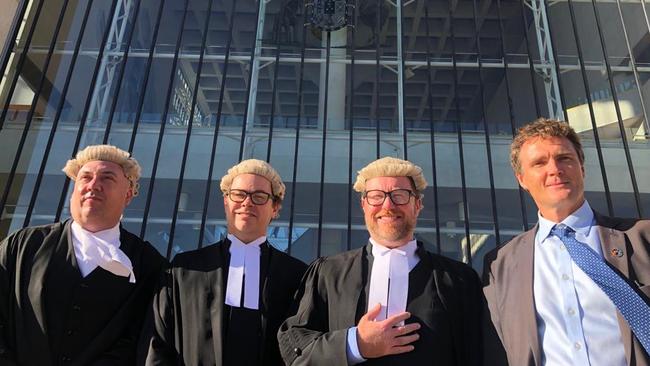Grafton law firm takes on NSW Police in High Court
A wrongful arrest case has made its way to the highest court in NSW, with a Grafton solicitor challenging the powers of NSW Police

Grafton
Don't miss out on the headlines from Grafton. Followed categories will be added to My News.
A GRAFTON lawyer has enjoyed one of the biggest wins of his career this week, with a victory over the NSW Police in the High Court of Australia over a wrongful arrest case dating back to 2013.
This week the High Court of Australia dismissed an appeal by the State of New South Wales against a decision made in the Court of Appeal of the Supreme Court concerning the power of a police officer to arrest a person, without a warrant.
According to the summary of the High Court’s findings, in December 2013 Bradford James Robinson entered Sydney City Police Station voluntarily where he was arrested by a constable for breaching the conditions of an AVO, however the constable had no intention, at the time of the arrest, of bringing Mr Robinson before an authorised officer to be dealt with according to law unless it later emerged that there was sufficient reason to charge him.
“An arrest under Section 99 can only be for the purpose, as soon as is reasonably practicable, of taking the arrested person before a magistrate (or other authorised officer) to be dealt with according to law to answer a charge for an offence,” the summary said.
“A majority of the High Court held that it followed that the constable did not have the power to arrest Mr Robinson pursuant to Section 99 when, at the time of the arrest, the constable had not formed the intention to charge him. The arrest was unlawful.”
Foott Law & Co solicitor Joe Fahey helped bring the case to the High Court, along with barristers Dominic Toomey SC, Dallas Morgan and Dean Woodbury, and were before the Justices in September.
Mr Fahey said the case first came to him years ago when Mr Robinson reached out to him over a case of wrongful arrest.
“I’ve been involved in bringing claims against NSW Police for a number of years now, and people seem to find me for whatever reason,” he said.
“Mr Robinson found me and we brought a claim for damages for wrongful arrest in the District Court, which we lost, but we appealed to the Court of Appeal, where we won.”
From there the NSW Police pursued the case further, and the High Court of Australia agreed to hear the case, where arguments were put to the Justices in September.
It took three months for the High Court to reach their decision, where they ultimately sided with the respondent Mr Robinson to find that in NSW, at common law, an arrest can only be
for the purpose of taking the arrested person before a magistrate, or other authorised officer, to be dealt with according to law to answer a charge for an offence.
Mr Fahey said the decision, released on Wednesday, could fundamentally change the arrest powers of the NSW Police.
“It establishes one of the things that must be required before a police officer can make an arrest, and that is an intention of bringing forward a related charge,” he said.
“If police aren’t intending on laying a charge, they can’t make an arrest. They can’t arrest someone for the purpose of questioning, they can’t arrest someone to make an investigation, they’ve got to have the intention of charging someone to make an arrest.
With the decision coming 4-3 from the High Court Justices in Fahey’s favour, he said it was a “nerve-racking” experience.
“Seeing that result was very exciting, it wasn’t unanimous but it’s a win,” he said.
“For this case to reach the High Court the other side had to get leave to appeal the Appeal Court’s decision to the High Court, who said this was an important enough point to warrant them making a decision on it.
“With the defendant the State of NSW, I think I know how Queensland felt for about 10 years after this.
“This was the first time I had been to the High Court and it might be last time. As far as I know it’s the first time someone in Grafton had a run there in around 60 years, according to some of my older laws predecessors.”


